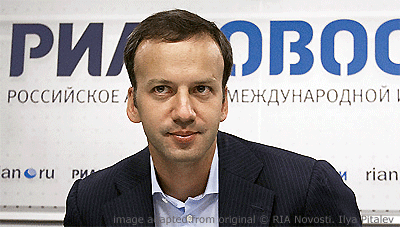Dvorkovich Joins Prophets of Economic Gloom

file photoAs European leaders scrambled to solve the continent's sovereign debt crisis Sunday, presidential aide Arkady Dvorkovich joined the ranks of those predicting that the world is facing a long period of slow economic growth.
The forecast aligns Dvorkovich who has said he would like to serve in a cabinet if President Dmitry Medvedev becomes prime minister in 2012 with other top Russian figures who have predicted a bleak future for the economy, including former Finance Minister Alexei Kudrin.
To expect international growth of 3 to 4 percent was "pointless," Dvorkovich told a conference held by Alfa Bank on Friday. Two percent growth for at least five to seven years was more realistic, he said.
A global slowdown would hit demand for Russian goods, particularly hydrocarbon and metal exports. But it is not just the economy that would suffer. A $1 drop in the price of oil results in a 55 billion ruble ($1.8 billion) fall in government revenue, acting Finance Minister Anton Siluanov said earlier this month.
"If nothing serious is done, [there will be] a low growth rate for the Russian economy," Dvorkovich said. "Of course, this will manifest itself in all indexes budget policies, budget expenditure, all those indicators that are connected with social development and everything linked with the financial sector."
Gross domestic product plunged 7.8 percent in 2009 but grew 4 percent last year. Prime Minister Vladimir Putin said last week that the country could expect growth of more than 4 percent in 2011.
Speaking at the same event, Deputy Economic Development Minister Stanislav Voskresensky said the basic prognosis for Russian growth was 3 to 4 percent. But, he added, the ministry had conducted stress tests that showed if oil averaged $80 a barrel, growth would be 2.5 percent. If oil were at $60 a barrel, he said, growth would be 1.4 to 2 percent.
The current price of Urals crude, the benchmark for Russian oil, is $109.83.
Dvorkovich is not the only high-level member of the Kremlin establishment to believe the global economy is set to stagnate.
Two days before his departure from the Finance Ministry on Sept. 26, Kudrin made a similar prediction. "We're in for a lost decade," he said. "It's already clearer that growth rates will be low and the fight to keep growth from dying out will take many years. Most likely, about five to 10 years."
While he was negative about long-term prospects, Dvorkovich said he thought that European leaders would succeed in addressing the immediate financial crisis engulfing their countries. Heads of European Union member states agreed Saturday on a $150 billion bank recapitalization plan and are set to hammer out a broader rescue package, focusing on Greece's debt woes, by Wednesday.
Dvorkovich stressed that the main obstacle to finding a solution to the financial problems was political, and he identified "an absence of political will to tell the truth and say what is really going on."
Pyotr Aven, head of Alfa Bank, was more blunt. "Today's world crisis is a political crisis, not an economic crisis," he said.
Russian stock markets appeared to concur that a solution to Europe's problems was imminent. MICEX rose 1.1 percent last week to 1,447.01. The dollar-denominated RTS climbed 2.4 percent to 1,456.73.
An ongoing stagnation in the world economy has been much-discussed in recent months. In an Oct. 19 report, investment bank Goldman Sachs put the chance of a "Great Stagnation" for developed economies at 40 percent.
Experts have been quick to point to signs that Russia might also be entering a period of low growth and economic stagnation, like that presided over by Leonid Brezhnev in the 1970s and 1980s.
Russian industrial production in September grew at its slowest pace since it began expanding in October 2009, after the end of the 2008 financial crisis.
Vladimir Tikhomirov, chief economist at Otkritie Capital, said that whether Russia will enter a period of slow growth and economic stagnation depends on whether its politicians undertake large-scale reform.
"It's very easy to come to the conclusion that there are no major drivers capable of pushing Russia's growth," he told The Moscow Times.
"If the government does nothing on reform, then stagnation will come and structural imbalances will increase, leading to social and political instability."
Russia, Economy, Business - Russian News - Russia - Johnson's Russia List

